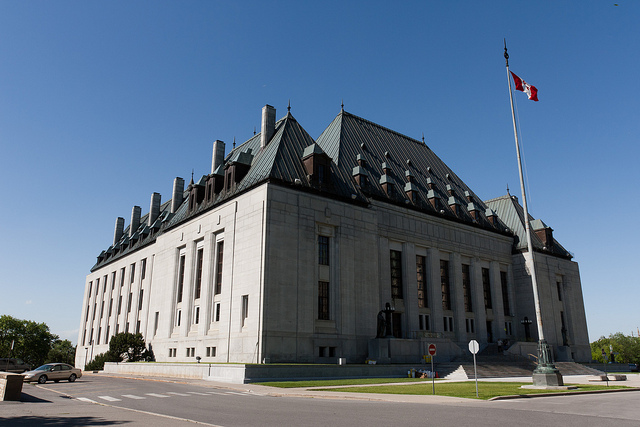The issue of sex work has been under the spotlight ever since the Supreme Court released it’s decision on the Bedford case last December. In that landmark ruling, the judges struck down three of Canada’s sex work laws. Major media outlets have been running news stories and editorials on sex work, activists and academics have been debating the issues and politicians have been hurriedly trying to sway public opinion.
The flurry of attention and the rush to establish a nation-wide agreement is heavily motivated by one looming deadline: the expiration of Canada’s current sex work laws. When the Supreme Court struck down the laws as unconstitutional, they ruled that the laws will remain in place for one more year in order to give the government time to develop and bring forward new legislation.
The government could, in theory, allow the current laws expire, in which case sex work could be treated like all other types of work. Alternatively, they can introduce new legislation. Justice Minister Peter MacKay has already stated that the government will introduce new legislation, and that it will do so “well before” the December deadline. The government is keen on instituting the Nordic model of dealing with sex work — in which the purchase of sex would be criminalized — but it is not yet known what specific laws they plan to introduce.
According to the Department of Justice website, an in-person consultation with “a number of stakeholder representatives” was held on March 3 “to seek their views and input” on the future of sex work legislation in Canada. There is no mention of who these individuals or groups were. What is apparent is that the perspectives of several major stakeholders were completely overlooked.
Maggie’s, WISH and PEERS are three of the largest sex worker support organizations in Canada, and none of them have been contacted by the government for their input. The people who staff these organizations have many years of experience providing support to those who work in the sex trade, and no doubt have a great deal of insight to offer on the problems that exist in the industry.
Kate Gibson, the Executive Director of WISH, reports that “No one from the government has contacted WISH to receive feedback directly from sex workers. One might hope that this would happen given that they are the ones who are the authorities in their lives and who are the most qualified to respond.”
Madame Sage, a representative from Maggie’s in Toronto, shared a similar revelation, lamenting that “As far as I know the government has not attempted to consult with any sex workers or sex worker organizations regarding the laws.” The government hasn’t reached out to PEERS in Victoria either. It is unclear who they are consulting with, and why they are not reaching out to people who have some of the most relevant experience of anyone in the country.
University of Victoria sociologist Rachel Phillips explains that when New Zealand was developing its sex work laws, “the New Zealand Prostitutes Collective was instrumental to shaping the legislation.” While not all of their requests were included in the policies that were created, Dr. Phillips notes that “at least they were part of the conversation.”
In a press release from earlier this year, Justice Minister Peter MacKay argues that “Our government is concerned about the significant harms that flow from prostitution to communities, those engaged in prostitution and other vulnerable persons.” Without collaborating with the country’s largest sex worker support organizations, it is unclear how the government could possibly appreciate the range of issues that are present in the sex trade.
To add insult to injury, some politicians insist that they are, in fact, conducting a fair examination of the sex industry. In a National Post editorial from March 25, Conservative Member of Parliament Joy Smith admonishes National Post columnist John Ivison for not listening to the perspectives of sex workers. She instructs Ivison to seek evidence “from the voices of those most directly affected” even though her own party continues to ignore the input of major sex worker organizations and prominent sex worker activists.
Many sex workers’ rights advocates are frustrated — and baffled — by the government’s flawed policy development strategy, but they are not giving up on trying to get their perspectives heard. Even as the government ignores them, several highly motivated individuals are attempting to disseminate their views to the general public.
Sex positive activist and Slut Walk co-founder Sonya Barnett recently launched a website called “After Bedford” in the hopes of bringing awareness to the concerns facing sex workers today. As well, a number of panel discussions have been held at universities across the country, giving highly qualified academics and researchers an opportunity to share their opinions on the best way for the country to tackle the issues that are present in the sex industry.
The government should be seeking the input of all major stakeholder groups, including sex workers, sex worker outreach organizations and expert researchers. By not doing so, they are wasting their time and the tax payers’ money because the findings that come out of their poorly executed consultation process will be of little use in creating an effective strategy for dealing with the problematic situations that can arise in the sex trade.
The development of new sex work laws is a very important matter, as legislation has the potential to deeply affect the lives of some of our society’s most vulnerable people. The government ought to be taking their approach to policy development more seriously.
Celine Bisette has been a sex worker in Canada for nine years. She blog about her experiences in the sex industry on her personal website and has published editorials on sex work in the National Post and the Ottawa Citizen.
Photo: flickr/Yi Su




